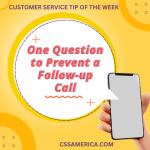
The man asked for his girlfriend’s hand in marriage, and she said: That’s not a problem!
The customer walks into the bike shop wearing a cast and notes that the new bike he just bought had brakes that failed and that need to get fixed. The employee responds: No problem.
The employee picks up the phone, and the customer says: Thank goodness I finally got a live voice! I’ve been on hold for 15 minutes! The employee responds: No problem.
These are just crazy examples…or are they?
I wish we could strike “no problem” from the list of acceptable phrases in the world of customer service. The problem with “no problem” is that it is literally saying that the customer is not a problem for the employee.
In the example above, the girlfriend’s sentiment is to shout Yes, but she says “no problem.” Oftentimes customers do their part in a process or are doing something nice for the employee, and instead of employees being appreciative, they say “no problem.” Where is the positivity and appreciation?
With the customer in the bike shop, there was an issue that was caused by the company, and instead of the employee being empathetic/understanding and accepting responsibility, he basically ignores all that and instead states “no problem.” Why would you just tell somebody who you’ve created a problem for that helping them is no problem?
Just because the customer who’s been on hold 15 minutes says “thank goodness,” that doesn’t mean that the employee should respond “no problem.” A 15-minute wait actually IS a problem.
In customer service, we talk about body language and tone of voice a lot, but the words matter, too. Appreciation for customers matters. Accepting responsibility for problems a company causes matters. Conveying some empathy for the difficulty customers had to go through to get to us matters. And all those things that matter don’t come across in the phrase “no problem.”
Realize the problem with no problem. Make sure the words we use convey the right message to our customers.
Signup for FREE Tips! Contact Us More Resources for You Visit Our Home Page























